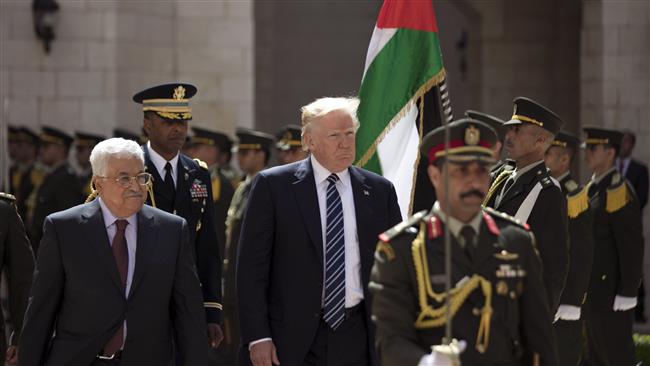
RNA - Speaking at the Middle East Institute in Washington, Husam Zomlot said Wednesday that Trump’s December declaration took everyone by surprise and killed the hope he had created by pledging to be a “fair mediator” who would help the two sides strike “the ultimate deal.”
“All our statements toward the administration until December 6th [the day Trump made his announcement] were positive. Despite all our concerns, we saw this administration as an opportunity,” Zomlot said, noting that his side was willing to compromise despite having doubts about Trump’s support for the so-called two-state solution.
More than a year into his presidency, Trump has yet to make a clear stance on the decades-long Israeli-Palestinian conflict. In fact, the Republican president’s statements have always been tainted by a relatively high amount of bias towards Israel.
In a White House press conference with Israeli Prime Minister Benjamin Netanyahu at the beginning of his tenure, Trump made a U-turn on decades of US policy in supporting a two-state solution by saying that he would not insist on it if it seemed too out of reach.
The Republican president’s lax stance on Israel’s settlement activities has further put the so-called peace process at risk.
Seemingly undisturbed by the consequences of his policies, Trump delivered on yet another one of his controversial campaign policies by announcing that he would move the US embassy in Tel Aviv to Jerusalem al-Quds, the eastern parts of which Palestinians hope would someday become the capital of a fully sovereign and independent Palestine.
Abbas’ snub to Pence
The decision drew condemnation from world leaders and prompted Palestinian President Mahmoud Abbas to snub US Vice President Mike Pence during his recent trip to the occupied Palestinian territories by going abroad.
The move did not go down well with Trump, who reacted by repeating an earlier threat to pull aid to Palestine.
“When they disrespected us a week ago by not allowing our great vice president to see them, and we give them hundreds of millions of dollars in aid and support, tremendous numbers, numbers that nobody understands - that money is on the table and that money is not going to them unless they sit down and negotiate peace,” Trump said at the sidelines of the World Economic Forum in Davos on Thursday.
Zomlot, who was posted as ambassador to Washington in mid-2017, said Trump had to propose a deal first before accusing Palestinian leaders of undermining it.
“What negotiations are they talking about? When was there an invitation that we rejected?” responded Zomlot, was posted as ambassador to Washington in mid-2017.
“Our rights are not for sale,” he said. “The world must understand this equation...Financial pressure doesn't work when it comes to national and human rights.”
The diplomat said “there was no table to sit at” because Trump had basically taken it away with his decisions.
‘You don’t meet with your oppressor’
Palestinians have defended Abbas’ refusal to meet Pence, with one spokesman for the president making it clear that they would not meet with the Trump administration unless the Jerusalem al-Quds decision was reversed.
Hanan Ashrawi, another senior Palestinian official, said “not meeting your oppressor is not a sign of disrespect; it is a sign of self-respect.”
In Davos, Trump doubled down on his decision but also tried hard to project himself as an honest broker.
“We have a proposal for peace. It is a great proposal for the Palestinians,” Trump claimed.
847/940